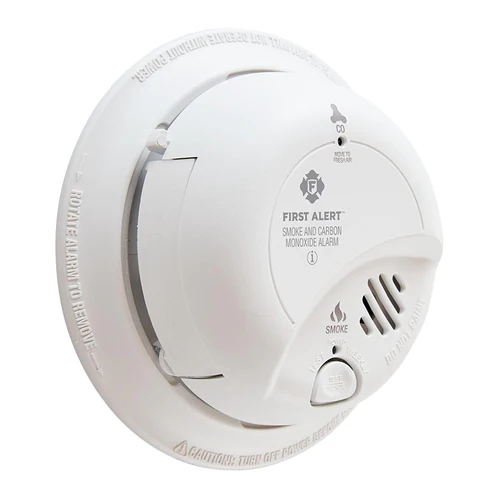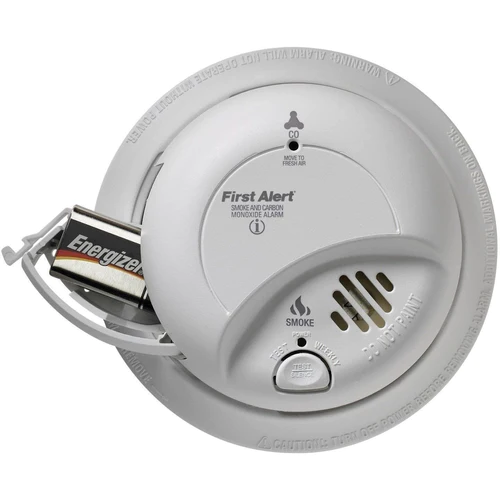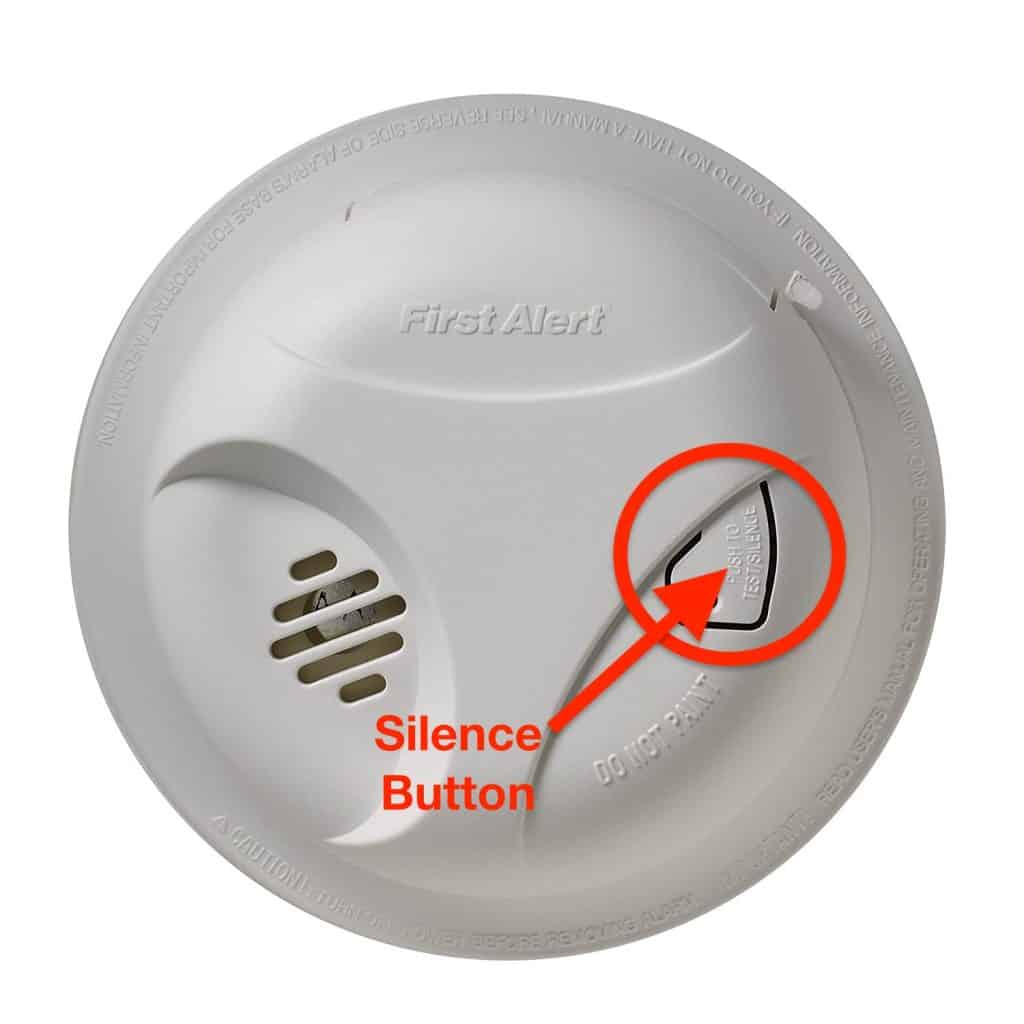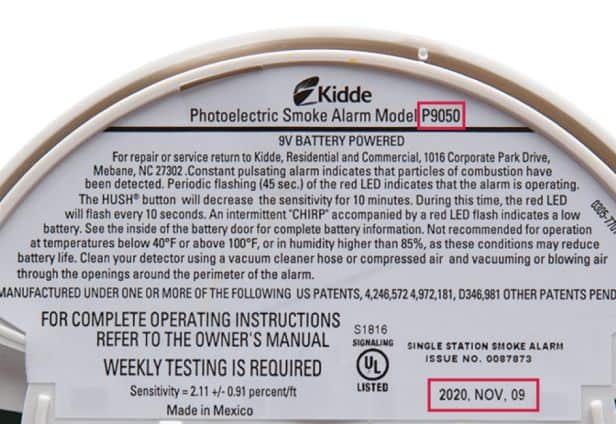You’re not alone if you find your First Alert smoke alarm beeping incessantly and you don’t know why. Running into an issue like this on a regular basis can be irritating and puzzling. But don’t freak out if your smoke detector goes off three times in a row — there are various possible causes for this, and we’ll explain how and when to fix them.
If you hear three beeps every three or four minutes from your First Alert smoke detector, this indicates a problem with the smoke detector’s circuitry. This might happen for various reasons, such as a low battery, a faulty battery connection, or because the smoke alarm has reached the end of its product lifecycle.
If your First Alert smoke alarm continues to beep, it is not a sign that it is broken or malfunctioning. Before calling a technician, check the power source, battery, and condition of the battery drawer. Resetting your smoke alarm is the best way to ensure it doesn’t constantly beep.

Why is my first alert smoke alarm beeping?
When the batteries in a smoke detector need to be replaced, it is designed to create a chirping sound. Some faults are due to issues in the processor of more recent smoke alarms. After changing the batteries, the smoke alarm should be error-free. However, it may persist with its beeping even after changing the batteries.
Smoke alarms powered by electricity with backup batteries are more likely to suffer from this problem. You may stop the chirping sounds by manually clearing the error from the CPU by resetting the smoke alarm. There is a problem with most smoke alarms because they are overly sensitive. You may find yourself in a situation where you have to deal with a lot of inconvenience and even false negatives because of this.
There are several reasons why a First Alert smoke alarm will beep, the most common of which is that the batteries are low.
The panel tells the user what’s going on using these beeps or chirps. The chirp count can determine the cause; if you keep a count, the below list explains the reason behind each count.
- One chirp for when the smoke detector needs battery replacement
- Three chirps for when the smoke detector has an internal hardware issue that’s causing malfunction
- Five chirps for when the detector has reached the end of its product lifecycle and should be replaced
- If your alarm is chirping intermittently, there could be multiple reasons, such as a dead battery, faulty wiring, etc.
- 4 Beeps and a Pause: EMERGENCY/SOS. It’s time to get out of the house and dial 9-1-1 because this could indicate carbon monoxide.
1 chirp
There could be many battery-related reasons behind the First Alert smoke alarm making 1 chirp per minute. Either the battery is low, facing the wrong direction, or the battery drawer is not closed properly.

Fixing your First Alert smoke alarm making 1 chirp
- You must replace the batteries once every year for smoke alarms with 9V or AA batteries. If it’s been that long for your First Alert smoke alarm, we suggest inserting new batteries to stop it from chirping.
- Another troubleshooting method for 1 chirp includes checking the battery panel and making sure that the batteries are inserted correctly and not facing the wrong direction.
- You must also check that the battery drawer is completely closed.
- If the chirping continues, you need to remove the residual charge from the old battery by resetting the smoke alarm. Press and hold the reset button for 15 seconds, and then wait for 1 minute before inserting new batteries.
Check out this video to know how to change the battery on your First Alert smoke alarm:
3 chirps
When your First Alert smoke alarm makes 3 chirps per minute, the cause behind it is an internal hardware malfunction and the alarm should be replaced.
5 chirps
Your First Alert smoke alarm may be beeping or chirping because it is nearing the end of its lifespan. Even if the battery performance is still decent, it is recommended to replace the alarm system with a new one.
Intermittent chirping
Intermittent chirping could indicate various issues, including battery depletion, battery drawer not closed properly, or the battery inserted wrongly.
Fixing your First Alert smoke alarm making intermittent chirps
- Make sure the batteries are inserted correctly by checking the direction they are facing. To silence the chirping, swap out the old batteries for fresh ones.
- Temperature and airflow issues can sometimes cause your smoke detector to chirp sporadically. For example, having it near a window, HVAC vent, or even your ceiling fan could make it chirp intermittently. Therefore, it is best to relocate the smoke detector if any of these factors lead to it being too chilly or too hot.
- If your First Alert smoke alarm continues to beep after you’ve replaced the batteries, you may need to clear the residual charge. Just reset the detector by pressing the reset button for 15 seconds and wait for 60 seconds before inserting fresh batteries.
- When nothing works, your final way out is to replace the device and install a new one at the optimum location in your house/workplace.
Check out this video to know how to reset your First Alert smoke alarm:
4 Beeps and a Pause
This is an indication of an EMERGENCY. Don’t waste a minute when you hear this chirping pattern, as this means your alarm has detected smoke or monoxide in the air. Then, quickly get out of the house and call 9-1-1 for help.
How to stop a First Alert smoke and carbon monoxide alarm that is beeping
You may be dealing with a “nuisance” alarm if your First Alert smoke alarm is beeping even though there is no smoke or fire in your home. This could be super annoying, but there are ways to stop your alarm from beeping.
The methods to fix the beeping alarm will differ based on the reason for the warning, whether it’s debris in the sensing chamber or the alarm is getting triggered by steam from your shower or even a steam iron.
Consider the following as a starting point for determining the root cause of the falsely beeping alarm and correcting any deeper issues with your First Alert alarm.
Use the silence button on your alarm
To mute a nuisance alert, press and hold the Test/Silence button on your equipment. This will silence the beep so you can determine what prompted the warning.

Check the manufacturing and expiration dates
You can find your First Alert unit’s manufacturing date on the back. Alarms have a limited lifespan. If your alarm is more than seven to ten years old, you should get a new one.

Clean the alarm unit
Make sure there are no bugs, trash, or dust in the battery chamber. Hidden dust, grime, or cobwebs might just have set off the alarm inside the device. Regular cleaning can stop alarms from making false beeps. Use a can of compressed air and a soft-bristled brush to clean your alarm detector.
Check The installation Location
The unit should not be placed near the steam, HVAC vents, or a window where it is exposed to direct sunlight. Some home areas could be more prone to situations that make an alarm go off and beep unusually. If your alarm is installed in a place where it goes off due to external factors that manipulate its sensitivity, it would be better to install it in a neutral space.
Here are a few tips for placing your First Alert smoke alarm.
- It should be installed at least 20 feet away from combustion-producing equipment like heaters and ovens. For smaller locations where a 20-foot (6-meter) distance is not reasonably possible, one must still ensure that the alarm does not directly face any heat-producing source.
- For high-humidity areas in the house, like bathrooms or laundry rooms, make sure that your unit is at least 10 feet away. Any closer than that could set off the false alarm or continuous beeping.
- Ventilators, fans, and light fixtures should be at least three feet away from your alarm unit.
Check for power outages
During a power outage, hardwired alarms may momentarily go off. Areas where power companies transfer grids early in the morning are prone to power outages. A loose hot wire connection can disable smoke alarms powered by AC or AC/DC. It has the same impact as if the electricity had gone out. The alarms may go off when the power is restored.
If there’s been a recent power outage in your area and your alarm is beeping, you must contact an electrician and get the wiring fixed.
Installed over a junction box
There are no battery-powered alarms that can be installed in a junction box. Putting battery-powered detectors on electrical junction boxes may result in false alarms. You should move the alarm unit if that’s the case.
Contact support
We encourage you to contact First Alert’s customer support team if you’ve tried every suggestion above and your unit is still beeping without reason.
Frequently Asked Questions
Many users suffer from the issue of their First Alert smoke alarm beeping continuously. Here are some related queries that we try to tackle in this section.
How many smoke alarms do I need in my house?
A smoke alarm on every floor, along with the basement, is typically recommended for enhanced safety. Smoke alarms should also be installed in bedrooms where people sleep with the doors shut.
Why does my smoke detector keep chirping even after I change the battery?
Some chirping could be due to bugs in the processor of newer models of smoke alarms. It causes the alarm to keep beeping even after battery placement. In such cases, one must reset the alarm first and then replace the battery.
How often should I replace my smoke alarms?
One must replace their smoke alarm at least once every ten years since the sensors wear out. Older alarms have a tough time detecting smoke when they’re covered with dirt and spiderwebs.
Conclusion
We hope this guide helps you understand the reason for your First Alert smoke alarm beeping. The best way to ensure that your smoke alarm keeps working effectively is by replacing its battery every six months and cleaning it every month. Also, please keep track of the expiry date and replace your unit when it gets old.
Are you looking for a new smoke alarm? Check out our X-Sense Smoke & Carbon Monoxide Detector Review.